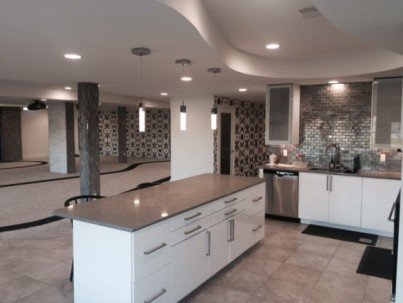A well-designed basement system can transform a neglected space into a valuable asset for any home. From increasing living space to improving structural integrity, investing in basement systems offers numerous benefits.
Increased Living Space
One of the primary advantages of a basement system is the opportunity to expand your home’s usable area. By waterproofing and finishing your basement, you can create additional bedrooms, recreational rooms, or even a home office. This not only enhances your living experience but also adds significant square footage to your property.
Improved Home Value
A properly maintained basement system can significantly boost the overall value of your home. Finished basements are attractive to potential buyers, offering them the flexibility to customize the space according to their needs. Additionally, a dry and functional basement indicates to buyers that the home has been well-cared for, increasing its market appeal and resale value.
Enhanced Structural Integrity
Basement systems not only benefit the aesthetics and functionality of your home but also contribute to its structural integrity. Waterproofing solutions and proper drainage prevent water damage, which can compromise the foundation over time. By maintaining a dry and stable basement environment, you protect your home from costly structural repairs and foundation issues.
Common Basement Issues
Despite their potential benefits, basements are prone to various issues that can detract from their usability and safety.
Water Leakage
Water leakage is a prevalent issue in many basements, especially those located in areas with high groundwater levels or poor drainage. Cracks in the foundation, inadequate waterproofing, or faulty plumbing can lead to water infiltration, causing damage to walls, floors, and belongings.
Mold and Mildew Growth
Excess moisture in basements creates an ideal breeding ground for mold and mildew. These fungi not only compromise indoor air quality but also pose health risks to occupants, particularly those with respiratory conditions. Proper ventilation and moisture control are essential for preventing mold growth and maintaining a healthy living environment.
Poor Air Quality
Basements with inadequate ventilation can suffer from poor air quality, characterized by musty odors and airborne contaminants. This can result from stagnant air, high humidity levels, or the presence of pollutants such as radon gas. Installing proper ventilation systems and air purifiers can mitigate these issues, creating a more comfortable and healthy indoor environment.
Importance of Professional Installation
While DIY projects can be tempting, when it comes to basement systems, seeking professional installation is crucial for ensuring optimal performance and long-term durability.
Expertise and Experience
Professional basement contractors possess the knowledge, skills, and specialized equipment necessary for tackling complex waterproofing and drainage issues. They can accurately assess your basement’s unique challenges and recommend tailored solutions to address them effectively. Additionally, experienced contractors adhere to industry best practices and building codes, ensuring compliance and quality craftsmanship.
Long-term Cost Savings
While professional installation may require a higher upfront investment, it offers significant long-term cost savings by preventing potential issues and costly repairs down the line. Properly installed basement systems are built to last, minimizing the risk of water damage, mold growth, and structural deterioration. By prioritizing quality and durability, you avoid the expenses and inconvenience associated with DIY mistakes or subpar workmanship.
Choosing the Right Basement System for Your Home
Selecting the appropriate basement system for your home involves a careful assessment of your specific needs and circumstances.
Assessment of Basement Needs
Before embarking on a basement renovation project, it’s essential to evaluate the condition of your basement and identify any existing issues or concerns. Consider factors such as moisture levels, existing waterproofing measures, and intended use of the space. This information will guide your decision-making process and help you determine the most suitable solutions for your home.
Customized Solutions
Every basement is unique, requiring customized solutions tailored to its characteristics and challenges. A reputable basement contractor will conduct a thorough inspection of your basement and develop a comprehensive plan that addresses your specific requirements. Whether you need waterproofing, sump pump installation, or moisture control measures, they will recommend solutions that meet your needs and budget.
DIY vs. Professional Installation
While DIY projects can be rewarding, when it comes to basement systems, entrusting the job to professionals offers several advantages.
Pros and Cons
DIY basement projects can be time-consuming, labor-intensive, and potentially risky, particularly if you lack experience or expertise in construction and waterproofing. While DIY kits and tutorials may seem cost-effective, they often pale in comparison to the quality and durability of professional-grade materials and installation techniques. Additionally, DIY mistakes can lead to costly repairs and compromise the structural integrity of your home.
Risk of Errors
Attempting to install a basement system without the necessary skills and equipment can result in costly errors and subpar results. Improper waterproofing or drainage solutions may fail to address underlying issues, leaving your basement vulnerable to water damage and mold growth. By entrusting the job to experienced professionals, you minimize the risk of mistakes and ensure that your basement is protected against potential hazards.
Maintenance Tips for Basement Systems
Proper maintenance is essential for preserving the functionality and longevity of your basement system.
Regular Inspections
Regular inspections are key to identifying and addressing potential issues before they escalate into major problems. Check for signs of water leakage, mold growth, or structural damage, and promptly address any concerns to prevent further damage.
Keeping Gutters Clean
Clogged gutters can contribute to water infiltration and drainage issues, leading to basement flooding and water damage. Keep your gutters clean and free of debris to ensure proper water flow away from your home’s foundation.
Managing Humidity Levels
Maintaining optimal humidity levels in your basement is crucial for preventing mold growth and maintaining a healthy indoor environment. Use dehumidifiers as needed to regulate moisture levels and improve air quality.
Conclusion
Investing in a well-designed basement system offers numerous benefits, including increased living space, improved home value, and enhanced structural integrity. By addressing common basement issues and choosing professional installation, homeowners can create a functional and comfortable living environment that adds value to their property.
FAQs:
- What factors should I consider when choosing a basement system?
- When selecting a basement system, consider factors such as your basement’s current condition, moisture levels, intended use of the space, and budget constraints. Consulting with a professional contractor can help you determine the most suitable solutions for your needs.
- How can I prevent water leakage in my basement?
- Preventing water leakage requires a combination of waterproofing measures, proper drainage, and regular maintenance. Ensure that your foundation is properly sealed, install sump pumps and drainage systems as needed, and keep your gutters clean to redirect water away from your home’s foundation.
- Is DIY basement waterproofing advisable?
- While DIY basement waterproofing kits may seem like a cost-effective option, they often lack the expertise and quality of professional-grade solutions. Improper waterproofing can lead to costly mistakes and potential damage to your home’s foundation. It’s best to consult with experienced professionals for reliable and long-lasting results.
- How often should I inspect my basement system?
- It’s recommended to inspect your basement system at least twice a year, preferably before the rainy season and during the spring thaw. Look for signs of water leakage, mold growth, or structural damage, and address any issues promptly to prevent further damage.
- Can basement systems increase the resale value of my home?
- Yes, investing in a well-designed basement system can significantly increase the resale value of your home. Finished basements are attractive to potential buyers, offering them additional living space and the opportunity to customize the area according to their preferences. Additionally, a dry and functional basement indicates to buyers that the home has been well-maintained, boosting its market appeal and resale potential.



